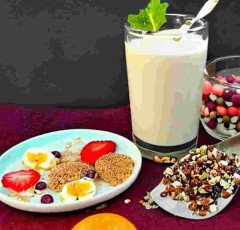For overall well being, gut health promotion is crucial. Better digestion, boosted immunity, and enhanced gut function can all result from eating foods that are high in beneficial nutrients and maintain a healthy gut flora.
The following foods are recommended for maintaining intestinal health:
Fermented foods and yogurt are high in probiotics, live beneficial bacteria that help maintain a balanced gut microbiome. Choose alternatives with live cultures instead of ones with a lot of extra sugar.
Kefir, Kefir, which is a fermented dairy beverage full of bacteria and similar to yogurt, may be good for gut health.
The probiotics and fiber in sauerkraut, made from fermented cabbage, help with digestion.Kimchi is a probiotic- and antioxidant-rich traditional Korean meal made from fermented vegetables, typically cabbage and radishes.Miso is a common Japanese condiment prepared from fermented soy, barley, or rice. It has probiotics and could help with intestinal health.Tempeh, A different fermented soy food that is high in protein and offers probiotics.Kombucha, A probiotic- and antioxidant-rich fermented drink that promotes intestinal health.Foods High in Fiber, Whole grains, fruits, vegetables, legumes, nuts, and whole grains are excellent sources of dietary fiber, which can support a healthy gut environment by providing food for good bacteria.Prebiotic Foods, Prebiotics are non-digestible fibre that feed your probiotics. Garlic, onions, leeks, asparagus, bananas, and chicory root are a few examples.Fatty Fish
Fish strong in omega-3 fatty acids, such as salmon, mackerel, and sardines, can lower inflammation and support a healthy gut lining.
Bone broth can help mend and seal the gut lining since it is high in collagen and amino acids.
The anti-inflammatory effects of ginger and turmeric can be advantageous for intestinal health.Apple cider vinegar: While further studies are required, some data indicates that apple cider vinegar may benefit gastrointestinal health.Everybody has a different stomach, and each person may react differently to certain foods. If you're not used to these foods, it's important to pay attention to your body and introduce them gradually. You should seek out individualized guidance from a healthcare provider or a trained dietitian if you have certain gut health issues or conditions.
lactic acid pickles: Pickles prepared by fermentation, like sauerkraut, can be a wonderful source of probiotics and healthy enzymes.
Artichokes, Rich in prebiotic fibers that can support the growth of healthy gut flora.
Chia seeds are a fantastic source of soluble fiber that can help with digestive health.
Flaxseeds, Flaxseeds, which are high in fiber and omega-3 fatty acids, can support regular bowel motions.
Sweet potatoes are a fantastic source of vitamins and fiber that can help with intestinal health.
Almonds, Almonds have prebiotic fibers and good lipids that are good for the intestines.Dark Chocolate, By supplying prebiotic fibers and antioxidants in moderation, dark chocolate helps enhance intestinal health.Green tea, Green tea, which is high in polyphenols, may benefit gut health and the microbiota in the gut.
Other fermented soy products, such as natto, can also be advantageous for gut health besides tempeh.
<
li>Probiotic supplements, In addition to dietary sources, probiotic supplements can aid in the maintenance of a healthy gut microbiota, particularly when used with a doctor's approval.Peppermint, Studies have shown that peppermint has a calming impact on the gastrointestinal system, which may help with digestion.
Berries, Strawberries, raspberries, and blueberries are full of fiber and antioxidants that can help with gastrointestinal health.Keep in mind that for general health, adopting a balanced and diverse diet that includes a wide range of nutrients is just as important as including gut-friendly foods. For better gut health, cut less on processed foods, sweet snacks, and excessive amounts of animal fat.
Reducing stress and engaging in regular exercise can improve gut health and general wellbeing.
It's crucial to address these parts of your lifestyle as well because stress and inactivity can interfere with gut function and the balance of gut flora.
Individual reactions to particular foods can differ, so if you have any digestive problems or questions, it's advisable to consult a healthcare provider or a qualified dietitian to develop a personalized plan that meets your individual requirements.
Hydration, It's crucial for gut health to get enough water to drink each day. Water aids digestion and maintains the balance of good bacteria.Reduce Added Sugars, A high intake of added sugars can impair gut health by encouraging the development of dangerous bacteria. Limit your consumption of processed meals, sweets, and sugary beverages.
Restrict the use of artificial sweeteners because some of them can disturb the gut flora and cause stomach pain in some persons. Modesty is important.Avoid Overusing Antibiotics, Although antibiotics are sometimes necessary for the treatment of illnesses, overusing them might upset the balance of gut bacteria. Consider taking probiotics in addition to any prescribed antibiotics to improve gut health.Thoroughly chew your meal to promote proper digestion by dissolving nutrients and facilitating their assimilation by the intestines. Regular Exercise, Exercise has been connected to better gut health and a more varied gut microbiota. Consistently engage in moderate-intensity exercise.Entire Foods, Opt for unprocessed, entire foods rather than heavily processed ones. Foods that have been processed may have additives that harm gut health.Eat a variety of fruits, vegetables, cereals, and sources of protein to encourage a diverse and healthy gut microbiota.Eat with awareness and mindfulness to ease the strain on your digestive system and increase nutrient absorption.Include Resistant Starch, Foods containing resistant starch, which functions as a prebiotic and supports intestinal health, include cooked and cooled potatoes, green bananas, and legumes.Fermented Teas, In addition to kombucha, probiotic-rich beverages like water kefir and jun (made with honey and green tea) can also help with gut health.Avoid Drinking Too Much Alcohol, Drinking too much alcohol might harm the gut microbiota and cause stomach problems.Sleep well, Aim for 7-9 hours of good sleep each night because insufficient sleep might harm gut health.Practice stress-reducing strategies like meditation, yoga, or time spent in nature to help prevent chronic stress, which can cause digestive issues.Avoid Smoking, Since smoking has been linked to a bacterial imbalance in the stomach, quitting or cutting back on smoking can help gut health.Being patient is crucial when making dietary and lifestyle adjustments for gut health because the process can take some time. Adding these suggestions gradually to your regular routine will assist your gut health and general wellbeing. Consult a medical expert right away if you have ongoing digestive problems so they can look for any underlying health issues.
Fasting Intermittently
According to some research, intermittent fasting may benefit the gut microbiome and advance gut health. However, before beginning any fasting program, it is imperative to speak with a healthcare provider.
Food should be stored properly to stop the growth of dangerous microorganisms. Keep an eye out for expiration dates and handle food safely.
Avoid overeating because it can strain the digestive system more than necessary. Aim to eat till you are satisfied but not overstuffed.A healthy gut flora may be maintained by ensuring adequate vitamin D levels. Spend some time in the sun or, if your doctor advises it, think about taking a vitamin D supplement.Whole Grains, To improve fiber consumption and support gut health, choose whole grains like brown rice, quinoa, oats, and whole wheat over processed grains.Avoid Artificial Additives, The gut's natural balance can occasionally be harmed by artificial preservatives and additives present in processed foods. When feasible, pick natural and organic products.Probiotic Foods for Kids: To support a healthy gut microbiome in kids from an early age, boost their consumption of probiotic-rich foods.Hygiene Habits, Maintaining proper hygiene by washing your hands before and after using the restroom can help stop the spread of dangerous bacteria.Avoid Unnecessary Antibiotics in Livestock, To minimize ingested antibiotic residues, seek meat and dairy products from animals grown without the routine use of antibiotics.Food Variety, Include a wide range of plant-based foods in your diet because they each provide unique nutrients that can support a variety of gut flora.Foods High in Collagen, Collagen can support the gut lining and enhance gut health. Sources of collagen include bone broth and collagen supplements.Avoid Consuming Too Much Red Meat, Red and processed meat consumption might have a detrimental impact on intestinal health. Choose thinner cuts, and add plant-based proteins to balance.Regular Bowel Movements, Stay hydrated, consume foods high in fiber, and engage in physical activity to maintain regular bowel movements.
Reduce Your Consumption of Spicy Foods and coffee
Some people's digestive systems can become irritated by consuming too much spicy food and coffee. Take note of how your body reacts to these things.
Probiotic Skin Care, Some skincare items include probiotics that can support a healthy skin microbiome, which may be indirectly related to gut health.
Since everyone has a different gut flora, what works for one person might not be effective for another. It's important to pay attention to your body's cues and modify as necessary. Consult a medical expert or a certified dietitian for individualized advice and suggestions if you have specific gut health issues or persistent digestive problems. Along with practicing these gut-friendly habits, having a balanced and healthy lifestyle can improve your overall well-being.
Proper meal pairing, For certain people, a particular food pairing can cause intestinal pain. Try out various combinations to see which one suits you the best.
Identify and treat any food allergies or intolerances that may be contributing to your gastrointestinal problems. Manage Food Allergies and Intolerances. Gluten, lactose, and a few FODMAPs (Fermentable Oligo-, Di-, Monosaccharides, and Polyols) are common offenders.Gentle Cooking Techniques, Instead of high-temperature frying, choose gentle cooking techniques like steaming, baking, and sautéing because they can maintain more nutrients and are easier on the digestive system.Acidic Foods in Moderation, While some acidic foods, such as tomatoes and citrus fruits, can be beneficial to health, overindulging in them may cause pain for some people's digestive systems.Maintain a Healthy Weight, Increased body weight has been associated with alterations in the gut flora, particularly in the area surrounding the abdomen. Maintain a healthy weight by eating a balanced diet and engaging in regular exercise.Avoid using antibacterial cleaning solutions, Using too many of these items can have a negative impact on the variety of gut flora. For the majority of cleaning tasks, use normal soap and water.Regularly Consume Fermented Dairy, Because they include probiotics, fermented dairy products like kefir and conventional yogurt might be advantageous for gut health.
Use mindful stress reduction techniques because long-term stress can harm gut health.
Reduce stress levels by practicing relaxation techniques like meditation, deep breathing, or mindfulness.
Adequate Sleep Quality, Make getting enough good sleep a priority because it is so important for maintaining gut health and general wellbeing.
Avoid Constant eating, The gut-brain axis might be upset by constant eating throughout the day, which may not provide the gut adequate time to relax.Drink herbal teas, Teas with calming properties for the digestive system include chamomile, peppermint, and ginger.Create a Healthy Gut Environment for Babies, Breastfeeding helps babies build a healthy gut microbiome.Foods High in Sulfur-Containing Compounds, Foods high in sulfur-containing compounds, such as garlic and onions, might encourage the development of good gut bacteria.Manage Chronic Inflammation, Gut health might suffer from chronic inflammation. Eat a diet low in inflammatory foods and high in fruits, veggies, and good fats.Practice Regular Relaxation, Take part in stress-relieving hobbies like reading, going for walks, or spending time in nature.Creating a sustainable and balanced approach to nourishing your body and supporting your gut microbiota is what promotes gut health, not enforcing rigid restrictions. Listen to your body, see how it reacts to various foods and lifestyle choices, and modify as necessary.
Consult a healthcare provider or a trained dietitian for individualized advice and direction if you have ongoing digestive problems or specific concerns about your gut health. They can assist you in developing a customized plan that takes into account your particular requirements and health objectives.
Probiotic Foods While Traveling, Due to changes in routine and diet, traveling might affect your digestive system. To keep your stomach in balance when traveling, think about packing some probiotic-rich foods like yogurt or fermented snacks.
Regularly consuming herbal bitters can help with digestion by encouraging the production of digestive enzymes. Examples of such bitters are dandelion greens and gentian root.
Avoid artificial sweeteners, Aspartame and sucralose, two artificial sweeteners, have been associated with detrimental effects on gut health. If necessary, choose natural sweeteners like stevia or modest amounts of honey or maple syrup.
Limit Processed Meats, Processed meats, such as sausages and deli meats, are linked to a higher risk of digestive problems. Limit their intake and, whenever feasible, pick whole, unprocessed meats.Try Intestinal Soothing Foods, Aloe vera, slippery elm, and marshmallow root are a few examples of foods that have historically been used to nourish and calm the digestive tract.Include Herbs and Spices, Use a range of herbs and spices, such as oregano, basil, thyme, and cinnamon, in your cooking as their antibacterial and anti-inflammatory characteristics may be beneficial to gut health.
Supportive Supplements
Some people may benefit from particular supplements to promote gut health, including L-glutamine for repairing the gut lining or prebiotic supplements for feeding the good bacteria in the stomach.
Seeds that have been fermented, such as fermented flaxseed, can offer more probiotics and improve intestinal health.
Maintain a Food Journal, Maintaining a food journal might assist you in identifying any particular meals or triggers that may be harming your gut health.Put mental health first, Gut health can have an impact on mental and emotional wellness. To manage stress, anxiety, and other emotional issues, seek support.Practice Gratitude, Developing an optimistic mindset and being grateful can have a great impact on all aspects of wellbeing, including gut health.Supportive Gut Health Testing, If you have ongoing digestive problems, go to a doctor who can perform supportive gut health testing to find any imbalances or underlying illnesses.Include Fermented Legumes, The gut microbiome can benefit from the increased diversity that fermented legumes like miso and tempeh can offer.Avoid Unnecessary Antibiotic Use, Antibiotics can upset the delicate balance of gut bacteria, so use caution if taken without a need.Limit artificial food additives because they can be detrimental to gut health, such as artificial preservatives and colors. Select whole foods, and carefully review the ingredient labels.
An continual process that combines diet, lifestyle, and specialized care is required to achieve and maintain a healthy gut. What works for one person might not work for another because everyone has a different gut microbiota. As you observe the consequences on your gut health, make changes gradually and with patience. You can receive individualized advice to assist you in achieving your gut health objectives by speaking with a healthcare practitioner or a certified dietitian.

























































































 TitTok Revolution
TitTok Revolution  Acer Laptop
Acer Laptop  Best Home Appliances
Best Home Appliances  Women Fashion
Women Fashion  ELECTRONIC ACCESSORIES
ELECTRONIC ACCESSORIES  Men Clothing
Men Clothing  Unreal Engine 5 For Beginners Learn The Basics Of Virtual Production
Unreal Engine 5 For Beginners Learn The Basics Of Virtual Production  NordPass
NordPass  All Wireless Products
All Wireless Products  Unlimited access to classes on illustration, photography, design, film, music
Unlimited access to classes on illustration, photography, design, film, music  The Click Engine
The Click Engine  NordVPN
NordVPN  ASUS Laptop
ASUS Laptop  Graphics & Design
Graphics & Design  1150+Trendy kids coloring pages Bundle
1150+Trendy kids coloring pages Bundle  Best Sellers On Amazon
Best Sellers On Amazon  Online Technology Classes
Online Technology Classes  Hello Theme
Hello Theme  Amazon Best Selling Products
Amazon Best Selling Products  Favorite Company (Cuelinks)
Favorite Company (Cuelinks)  Top Rated From Amazon
Top Rated From Amazon  Smart Doorbell
Smart Doorbell  RPM 3.0
RPM 3.0  Only For The United States
Only For The United States  Artificial Intelligence
Artificial Intelligence  BEST SELLER TOP10
BEST SELLER TOP10  Sennheiser
Sennheiser  ASPINAL LONDON
ASPINAL LONDON  Online Marketing
Online Marketing  SEO Checklist
SEO Checklist  Hot Bags For Pain Relief
Hot Bags For Pain Relief  The Secret Email System
The Secret Email System  One World Collection
One World Collection  Creative Brief For Video Shoot
Creative Brief For Video Shoot  Best Robotic Vacuum Cleaners
Best Robotic Vacuum Cleaners  SOFAS
SOFAS  NordLocker
NordLocker  Best Selling Books
Best Selling Books 
















